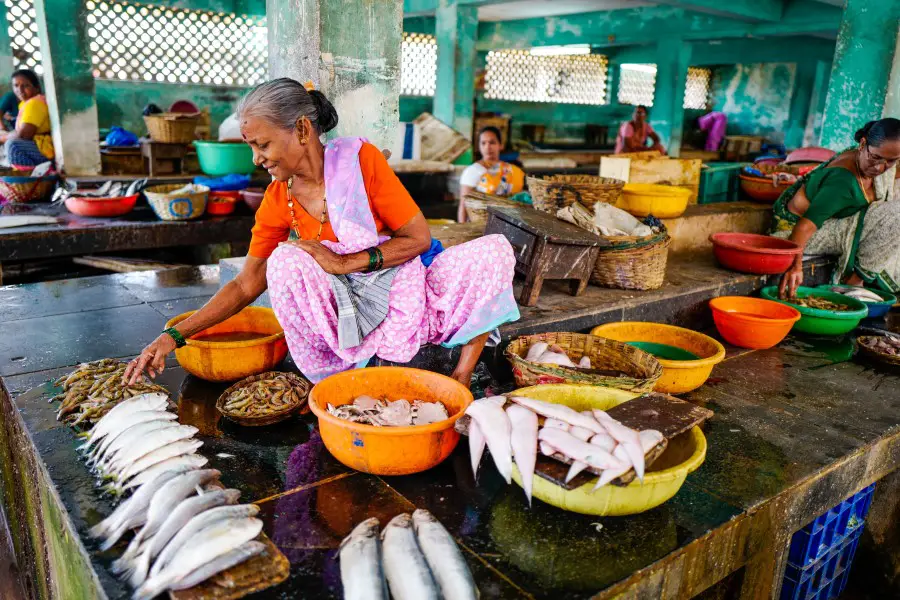This page contains affiliate links. This means if you a follow a link and make a purchase, at no additional cost to you, Humanitarian Careers will receive a commission. Thank you for supporting the site.
India is the sixth largest economy in the world and it’s fast becoming a wealthy nation. However, nearly a fifth of Indians live in poverty and the country is racked by widespread and extreme destitution. India has a large and thriving NGO sector that works to lift people out of poverty and is active in communities throughout the nation.
Many people want to work for NGOs in India. NGOs not only provide fair paying jobs with good conditions, but more importantly let people dedicate their careers to helping India’s most in need people. We’ve put together this guide for anyone interested in getting a job with an NGO in India.
Types of NGO Recruiting In India
The first step we need to take in order to apply for an NGO job in India is understand the different types of organisations recruiting NGO positions in the country. Generally, NGOs in India can be broken into two main groups.
One type of NGO in India are international NGOs. These are organizations with headquarters in other countries, but that run programmes in India. International NGOs are usually based in Western nations, such as in the US or Europe, and have country offices all around the world. Many major international NGOs have large scale project across India.
Another type of NGO in India is what is known as ‘national’ NGOs. These are organisations that are local to India and only work in the country. They are founded by Indians and often have a long history addressing the needs of people living in poverty or impacted by disasters. Many national NGOs in India raise funds at home, and receive grants form international donors to fund their work.
Generally, international NGOs are larger organizations employing up to hundreds, or even thousands of people. National NGOs can also be big, but there are also many smaller national NGOs working across India.
Top Indian NGOs To Apply To
Now we know a bit about the different types of NGOs recruiting in India, let’s look at some examples of both national and international NGOs working in the country. Some of the top NGOs working in India include:
- Smile Foundation
- Nanhi Kali
- Oxfam
- Save the Children
- Goonj
- Care International
- Pratham
- Help Age
Now we’ll briefly look at each of these…
Smile Foundation
Smile Foundation is an Indian NGO working with children living in poverty. They also have projects related to healthcare, education, livelihoods, women’s empowerment and disaster response. Founded in 2002, Smile Foundation reaches millions of children and families across India each year.
Nanhi Kali
Nanhi Kali is a national NGO in India. Started in 1996, Nanhi Kali works to provide educational support to children, especially girls. They run a child sponsorship programme across India as well as train teachers and campaign for better education support for girls in India.
Oxfam
Oxfam is a British NGO with projects in over 80 countries. Oxfam’s work in India was started in 1951. It provides humanitarian assistance as well runs disaster risk reduction projects. Oxfam India also works on economic and gender empowerment.
Save the Children
Save the Children is one of the largest children’s charities in the world. With programmes in over 100 countries, Save the Children has been operating in India for decades. In 2008, Save the Children established its Indian branch. Save the Children runs projects across India focusing on child protection, education, healthcare and water and sanitation.
Goonj
Goonj is an award-winning Indian NGO working on humanitarian and disaster relief, as well as economic and community development. With projects in 23 Indian states, Goonj also works on water and sanitation, education, livelihoods and women’s empowerment projects as well as improving infrastructure.
CARE
CARE International in an American NGO that has been working in India since 1950. In 2008, CARE international founded CARE India to lead its projects in-country. CARE India has programmes covering education, healthcare, livelihoods and disaster relief.
Pratham
Pratham is an education NGO that aims to improve the access and quality of schooling for children living in poverty in India. The NGO runs a range of projects including primary and secondary education, digital access to education and assistance for vulnerable children.
Help Age
Help Age is a global NGO working with older people and their communities. They run a range of projects in India including healthcare, and disaster relief focused on older people. They also campaign on behalf of the elderly and run livelihoods projects across India.
NGO Roles In India
With so many NGOs working in the country, there are almost an unlimited number of different jobs within the Indian NGO sector. However, generally, NGO roles in India can be split into five main categories:
- Management Jobs
- Programme Roles
- Support Roles
- Consultants
- Interns
Let’s take a quick look at each of these in-turn…
Management Jobs
All NGOs have a range of management jobs. These positions are responsible for overseeing the implementation of an NGOs project, whilst managing large teams and coordinating the NGOs operations. Managers within NGOs, including in India, can either be responsible for a technical department, such as overseeing education or WASH projects, or a support function such as logistics, finance or human resources.
In order to work in a management position within an NGO in India you will need several years relevant experience with NGOs. Overseas experience working as an expatriate would add to your application. Previous senior level experience, as well budget management and team leading experience will be highly sought.
Programme Roles
NGO programme roles work directly on an NGOs projects coordinating the delivery of aid to people in need. They either work on, or have oversight of, technical programme areas. These can include in nutrition, food security, healthcare, education, micro-finance and water and sanitation. There are a huge range of programme roles within NGOs, from field staff working directly on the frontline, to senior positions coordinating the programmes work.
If you want to work for an NGO in India in a programmes role you will need the relevant technical background. This can include a related college degree or diploma, as well as some professional experience.
Support Roles
Support roles in NGOs cover areas such as logistics, finance, HR, grants management and security. They support the implementation of an NGOs projects. Like with programme roles, NGOs will hire all levels of support jobs, from managers overseeing support departments to positions stationed within field bases directly supporting frontline programmes.
Although a relevant college degree and experience in a similar support role within the NGO sector would be beneficial, you can get support positions within Indian NGOs by transferring from the private or public sector. Most NGOs look for candidates with the relevant skills, so if you can prove your knowledge of an area such as finance, logistics or HR, you can get a support job within an Indian NGO.
Consultants
Consultants are widely used in the NGO sector in India. NGO’s hire consultants to deliver specific pieces of work within a set time period. Consultants often bring technical expertise that the NGO does not have in-house. NGOs in India also hire consultants to assist them with navigating bureaucratic processes, such as reporting to local authorities and getting the required registration and permits to work.
You will need significant relevant experience to be hired as consultant by an NGO in India. Technical expertise is often required, as well as proven previous experience advising NGOs in the country.
Interns
Many NGOs in India recruit interns. Taking an internship with an NGO can be a fantastic way to start a career in the sector. Generally interns in NGOs are not paid, but there are some Indian NGOs that provide a stipend for their interns.
Interns in Indian NGOs can either work attached to specific departments, or work across functions providing general support. A relevant college degree will help you get an internship at an Indian NGO.
Qualification Needed To Work For An Indian NGO
If you want to work for an NGO in India you will need to be qualified. NGO job are competitive all over the world, but in India they are often seen as good jobs, with fair pay and decent working conditions. Therefore, in order to secure an NGO job in India, one of the most important steps you need to take is to become qualified.
The first thing you need to do to become qualified to work for an NGO in India is gain a college degree. NGOs around the world need highly qualified staff and almost all NGO jobs require a minimum of a bachelor’s level education. In fact, the majority of NGO jobs, including in India, ask for a master’s degree. If you can, complete your college education up to masters level before applying for an NGO job.
When choosing what subject to study at college, if you want to work for an NGO, you should consider subjects related to different positions within the NGO sector.
For those aiming to work in technical programme roles, you will need the relevant qualifications in order to do the job. For example, to be a medical programme manager, you need a medicine degree. To work on micro-finance projects, an economics degree is often required.
Those that want to work in support roles for NGOs in India should consider taking courses in humanitarian action, disaster management, migration studies or NGO management. Courses such as these will provide a theoretical background needed to work for an NGO.
As well as completing a college degree, ideally related to NGO work, another step you should take to become qualified to work for an NGO is completing relevant online short courses.
University degrees are great at providing a broad basis needed to do NGO work. However, taking an online short course allows you to gain practical knowledge directly related to the NGO sector. Including some short courses in your CV when you apply to an NGO can be highly beneficial.
For those already in their careers who want to transition to NGO work, and do not want to go back to college, online short courses can also be a great way to learn relevant skills and create a CV more tailored to the NGOs sector.
NGO Online Courses
If you want to know more how to get a job with an NGO, we highly recommend the online course Introduction to NGO Management. It goes over how NGOs operate and introduces students to the unique aspects of the NGO sector. Follow the link for more information.
Another online course we highly recommend for those wanting to know more about NGOs is How To Design and Fund International Development NGO Projects. Anyone working for an NGO needs a basic understanding of how NGO projects are set-up, and how to input to funding proposals. Click the link to get more information on the course.
If you are looking to work for an NGO, we highly recommend the online course International Humanitarian and Development Careers. We think it provides one of the best overviews of the NGO sector and gives a clear breakdown of the skills needed to get an NGO job. It also provides valuable information on how to successfully apply for positions within NGOs. Click the link to be taken to the course’s page.
Applying To NGO Jobs In India
When applying to NGO jobs, including in India, there are a few good tips to follow.
First of all, as we’ve said, NGO jobs are very competitive. This is especially true in India. Therefore, if you don’t have any previous NGO experience, you will need to send a lot of applications in order to get short-listed for an interview. And we mean… a lot! Don’t get discouraged, but do be prepared to send dozens or more applications to NGOs if you are trying to start a career in the NGO sector in India.
Another thing you need to do to land an NGO job is to be tailoring your CV and cover letter for each application. NGO recruiters everywhere, including India, will be looking for candidates that can show in their applications an understanding of the role and what is required. Editing your application for each job is key to this.
…because you need to send a lot of applications, and need to tailor each one, design system so you can easily and quickly update your CV for each position. Have a few core sections of your CV and cover letter you update – such as the headlines, relevant experience and successes, and why you want to work for this NGO. Leave parts like your education, training and brief overviews of each role the same. Planning out how you can easily tailor your application is key to getting a lot our quickly, which in turn will be vital for landing an NGO job in India.
NGO recruiters in India will get many applications for each open position. A good tip is to put a headline at the top of CV including three or four bullet points explaining exactly why you are right for the role. This will catch the recruiter’s attention and help you get short-listed for an interview.
Make sure you include a brief line in your cover letter explaining why you want to work for this particular NGO, and that you are passionate about their mission and work. Review the NGOs website to find it’s core mandate and values and try to include these in this part of your cover letter.
Where To Find NGO Vacancies In India
If you are looking for an NGO job in India there are many websites that list open vacancies. Some of the largest sites are:
As well as these websites, there are many smaller local job boards that also include NGO vacancies in India. Make sure you regular browse these as well to find jobs you can apply for.
If you want to know more about how to get a job with an NGO, explore our page on the top NGO online courses here.





